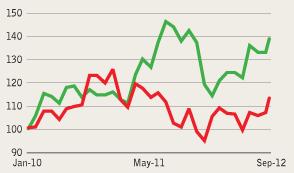Ups and downs
The Burmese currency’s buying and selling rates have narrowed considerably. Street rate for the US dollar is 983 kyat, while the kyat sells at 983.5 kyat to the dollar. Gold is selling at 686,000 kyat per tical; that’s 3,300 kyat up from last week. Fuel remains constant: petrol 820 kyat, diesel 950 kyat, and octane 920 kyat per litre. High-quality Pawhsanmwe rice is still selling at Rangoon marketplaces for 1,200–1300 kyat per basket while low-grade Emata rice sells at 850– 900 kyat.
Thein Sein to meet with business leaders
Burma’s President Thein Sein is scheduled to meet hundreds of businesspeople and investors at the Union of Myanmar Federation of Chambers of Commerce office in Rangoon on Saturday, 22 February. According to a UMFCCI official, more than 350 businesses will be represented.
Foreign firms eye Thilawa SEZ
About 40 foreign manufacturers have indicated an interest in setting up at the Thilawa special economic zone being developed with Japanese help outside Rangoon, according to a Reuters report on Friday which cited a Burmese official saying that commercial operations could start in mid-2015. Set Aung, vice-governor of Burma’s central bank and chairman of the committee overseeing the economic zone, said the potential investors were producers of clothing, foodstuff, electronic appliances, toiletries and car parts.
24 new hotels given green light in January
Twenty-four new hotels offering a total of nearly 1,000 rooms were granted licenses in January to cater for Burma’s growing surge of tourists, according an announcement by the Directorate of Hotels and Tourism. With the new additions included, there are now 947 hotels in Burma and more than 35,000 rooms. The announcement said a budget of over 250 billion kyat (US$250 million) was allocated to the Hotels and Tourism sector in the 2013-14 fiscal year.
World’s second largest law firm opens office in Burma
Baker and McKenzie is by revenue the world’s second-largest law firm and now has an office in Rangoon. The “new frontier” office is set to serve the first wave of investors entering Burma’s much-coveted energy, mineral and consumer markets. The Rangoon office is Baker & McKenzie’s 16th in the Southeast Asia and will employ five local lawyers.
Thai Oil plans $1 billion investment in Burma
The largest oil refiners in Thailand, Thai Oil Public Co Ltd, has announced its intention to invest about US$1 billion in Burma this year, according to the Bangkok Post. Executive officer Veerasak Kositpaisal said Thai Oil has proposed two investment projects to the Burmese government including the construction of an oil refinery in Thanlyin, just outside Rangoon, which would produce 40,000 barrels per day.
VP warns Burmese firms against falling under foreign control
Burma’s Vice-president Nyan Tun has warned domestic companies working in joint ventures with foreign firms in Special Economic Zones (SEZs) not to “fall under foreign control”. According to a report by Dawei Project, Nyan Tun said that working together with foreigners will bring more investment, technology and know-how, but local firms must establish “a strategy for all obstacles”. Burma is currently implementing three SEZs in Dawei, Thilawa and Kyaukphyu, all with heavy backing from Japan and Thailand.
Maersk makes Burma its port of call
The A P Moller-Maersk Group has received a permanent licence to operate container business activities in Burma, according to industry magazine Cargonews Asia. The business will reportedly encompass the three brands: Maersk Line, MCC Transport and Safmarine and it hopes to open its Rangoon agency in May.
“Macro-economic indicators signal a continuous expansion of growth in the country due to infrastructure development and investments in industries such as agriculture and garments,” said Cargonews Asia.
Timber sales rise as logging ban nears
Raw timber export is estimated to rise by 33 percent this year, in the lead-up to a nationwide ban on 1 April 2014. Bar Bar Cho, secretary of the Myanmar Timber Merchants Association, said, “On average, the annual value of timber exports was between US$600 to 800 million, but we are likely to see a rise in the number – estimated between US$1 to 1.1 billion this year — due to high a record of exports in the past six months.”
Read more: http://www.dvb.no/news/timber-ban-effective-in-april-leads-to-wood-export-rush/37575



